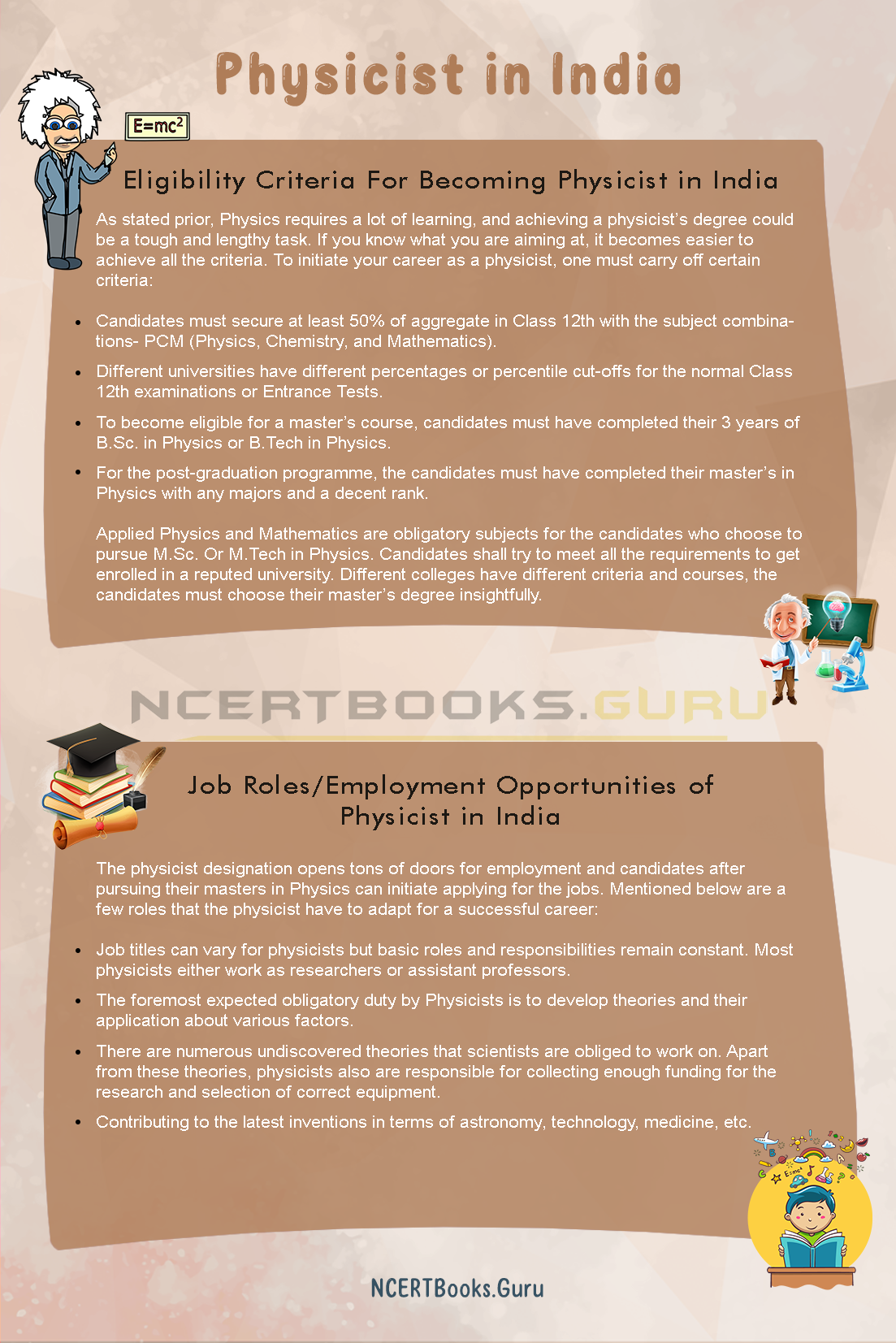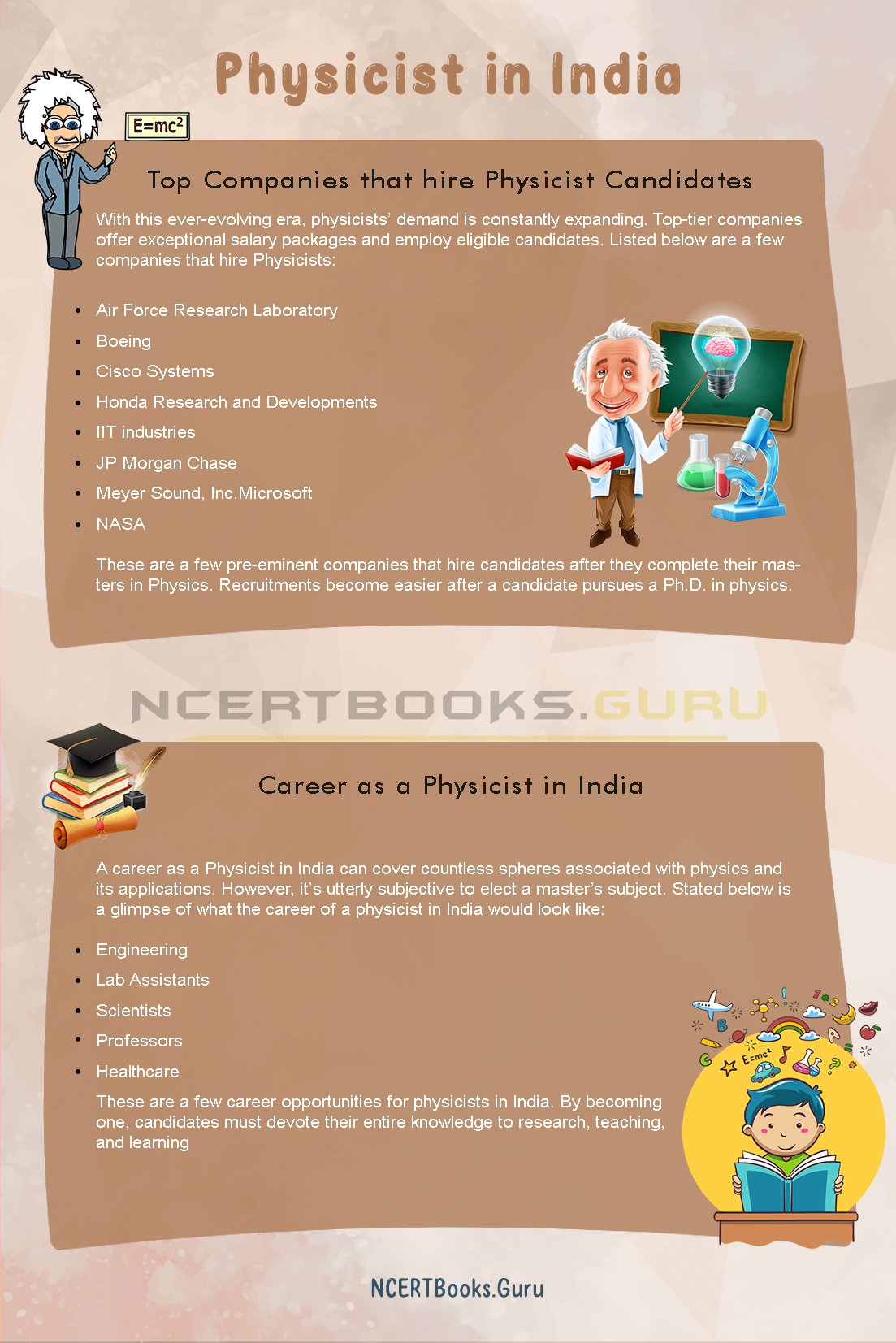How to Become a Physicist in India: Mastering physics could be a bit arduous and is a stretched-out process. However, becoming a physicist required years of academic & practical knowledge. A physicist is a reputable designation and should only be chosen if one is sure about their niche in the subject.
In this step by step guide on how to become an idian physicist, you will learn more about the Physicist, the process of becoming a physicist, salary, best colleges and so much more that would procure you surety about the physicist career.
What is a Physicist?
Physicists are a type of scientist that are indulged in Physics-related research programmes. Their immense knowledge can be executed for new technological research or solving physics problems. Physicists apply their learning to bring in new physical phenomena to develop upcoming technologies and theories.
Physicists play a crucial role in various spheres such as research and analysis, instrumentation, design, and development of various types of equipment as well as putting forward functional theories accompanied by its applications. This article would aid you in attaining a clear understanding of Physicist as a career prospect and would guide you in the process of how to become a Physicist in India.
Types of Physicists in India
Physics is an enormous field to work on and has several other branches such as Optics, Acoustics, Electromagnetics, and Classical mechanics. Similarly, there are various types of physics geniuses that work on distinct branches of physics to invent innovative technologies and more. Listed below are a few types of Physicists found in India:
These physicists apply laws of physics to come up with the latest theories affiliated with the universe, its components, and its existence. Astrophysicists are interrelated with astronomy and work generally on space, planets, and more.
- Biophysicists
Biophysicists are a bridge between biology and physics. These scientists apply their physics knowledge to biology to gain a better understanding of human life and how it works.
- Physical Chemists
Similar to Biophysicists, these scientists have equal proficiency in Physics as well as chemistry and they fuse both the subjects to innovate new chemistry-based applications and to comprehend the subject better.
- Geophysicist
Primarily, Geophysicists work on whys and hows of the planet earth, accompanied by other planets, earth’s crust, life on planets, what’s inside the earth, and so on.
- Nuclear Physicist
As the name defines, nuclear physicists, work on atoms, nuclei, nuclear fission, and fusion. The limelight is on the nucleus’ constituents, matter, and radioactivity.
- Quantum Physicist
These physicists portray answers for how things work in general, in chemistry, in physics, or any other subject by implementing their physics as well as mathematical knowledge.
- Theoretical Physicist
Theoretical Physicists optimize mathematical equations to put forward different elaborated and well-structured physics theories. This field is mostly called for in universities or scientific-focused institutes.
How to Become a Physicist in India? [A Step By Step Guide]
Physicists are a desideratum career pathway that is academically long-drawn-out but is still chosen by many aspiring candidates. To become a Physicist in India, one has to follow certain steps and do a lot of learning to achieve the respective designation. Here’s how you can become a Physicist in India:
- Entrance Exam: An entrance exam is indispensable and is necessary to get enrolled in a good undergraduate physics programme. Candidates can appear for entrances such as JEE or CET to secure admission into a reputed university for B.tech in Physics. B.Sc. in Physics majorly doesn’t require an entrance examination. Every physics course doesn’t require an entrance exam but most of them do.
- Undergraduate Preparation to become a Physicist: If the candidates desire to excel even further in this career, they can apply for Postgraduate courses as well. Candidates must hold an undergraduate degree in B.Sc. Physics or in B.Tech. Physics. Generally, universities demand 50% – 60% of aggregate from a recognized university. Some institutes conduct their entrance examinations such as JNUEE, IPU CET, etc.
- Postgraduate Preparation to become a Physicist: To enter into a Doctorate programme, the candidates must secure at least 60% of the aggregate from a recognized university in any physics-related discipline. The candidate will receive their master-subject based on the percentage. There are private entrance examinations such as UGC-NET, JEST, etc. At times, an interview is also conducted for the candidates to evaluate their research projects and to analyze their physics knowledge.
These are the crucial steps to becoming a Physicist in India. The candidate needs to fulfill all the eligibility criteria to apply for the foremost physics universities across the nation.
How to Become Physicist after 12th?
Either the candidates can appear for entrances or they can secure a decent percentage in Class 12th to enroll themselves in a notable university. The main focus subjects must be Physics, Chemistry, and Mathematics as physics requires a lot of mathematical explanations and applications. Candidates must secure at least 50% in class 12th. However, few private universities conduct their entrance exams such as GSAT and DUET, etc.
Top Best Colleges in India and Fees Structure for Physicists Courses
It’s obligatory to pick the best colleges or universities for your B.Sc. in Physics or B.tech in Physics Courses. Colleges have a crucial part in moulding your career and hence should be chosen wisely. Listed below are a few best colleges along with their fees structure and ranking.;
| Name | Rank | Fees Structure |
| St. Stephen’s College, New Delhi | 8.7/10 | INR 42, 835 |
| Hindu College, New Delhi | 8.5/10 | INR 18,110 |
| Loyola College, Chennai | 8.6/10 | INR 12,110 |
| Madras Christian College (MCC), Chennai | 8.6/10 | INR 24,500 |
| Hansraj College (HRC), New Delhi | 8.4/10 | INR 24,115 |
These are a few best-ranked colleges in India for physics. Students can check out the eligibility criteria and try to secure the best grades in your class 12th.

Eligibility Criteria For Becoming Physicist in India
As stated prior, Physics requires a lot of learning, and achieving a physicist’s degree could be a tough and lengthy task. If you know what you are aiming at, it becomes easier to achieve all the criteria. To initiate your career as a physicist, one must carry off certain criteria:
- Candidates must secure at least 50% of aggregate in Class 12th with the subject combinations- PCM (Physics, Chemistry, and Mathematics).
- Different universities have different percentages or percentile cut-offs for the normal Class 12th examinations or Entrance Tests.
- To become eligible for a master’s course, candidates must have completed their 3 years of B.Sc. in Physics or B.Tech in Physics.
- For the post-graduation programme, the candidates must have completed their master’s in Physics with any majors and a decent rank.
Applied Physics and Mathematics are obligatory subjects for the candidates who choose to pursue M.Sc. Or M.Tech in Physics. Candidates shall try to meet all the requirements to get enrolled in a reputed university. Different colleges have different criteria and courses, the candidates must choose their master’s degree insightfully.
Also See: Astrophysics Courses
Job Roles/Employment Opportunities of Physicist in India
The physicist designation opens tons of doors for employment and candidates after pursuing their masters in Physics can initiate applying for the jobs. Mentioned below are a few roles that the physicist have to adapt for a successful career:
- Job titles can vary for physicists but basic roles and responsibilities remain constant. Most physicists either work as researchers or assistant professors.
- The foremost expected obligatory duty by Physicists is to develop theories and their application about various factors.
- There are numerous undiscovered theories that scientists are obliged to work on. Apart from these theories, physicists also are responsible for collecting enough funding for the research and selection of correct equipment.
- Contributing to the latest inventions in terms of astronomy, technology, medicine, etc.
Besides, candidates can choose from a pool of careers to take the yield of and select a major field in physics. Roles can differ based on their job profiles.
Top Companies that hire Physicist Candidates
With this ever-evolving era, physicists’ demand is constantly expanding. Top-tier companies offer exceptional salary packages and employ eligible candidates. Listed below are a few companies that hire Physicists:
- Air Force Research Laboratory
- Boeing
- Cisco Systems
- Honda Research and Developments
- IIT industries
- JP Morgan Chase
- Meyer Sound, Inc.Microsoft
- NASA
These are a few pre-eminent companies that hire candidates after they complete their masters in Physics. Recruitments become easier after a candidate pursues a Ph.D. in physics.
Career as a Physicist in India
A career as a Physicist in India can cover countless spheres associated with physics and its applications. However, it’s utterly subjective to elect a master’s subject. Stated below is a glimpse of what the career of a physicist in India would look like:
- Engineering
Engineers are supposed to work in either automobile industries or astronomical sectors. Many international companies offer great employment opportunities to candidates who have obtained engineering in physics degrees.
- Lab Assistants
The lab assistant is a career widely elected by the candidates who are in the last year of M.Sc. Physics or as internships by the undergraduates. Lab Assistants or lab technicians assist the experimenters.
- Scientists
The core primary job objective as a physicist is to analyze and put forward new theories and to uncover many basic questions of the science quintessence.
- Professors
Teaching is another popular field among the M.Sc. Physics graduate. However, to secure a designation in a reputed institute, candidates must’ve completed their Ph.D. too.
- Healthcare
Physics is intertwined with medicine and biology to proccur new and emerging technology to the world. Physics can be applied in developing healthcare equipment for Cardiology, Neurology, Radiology, Radiation Oncology, and Nuclear Medicine.
These are a few career opportunities for physicists in India. By becoming one, candidates must devote their entire knowledge to research, teaching, and learning.

What is the salary of a physicist in India?
The salary of the Physicists fluctuates as per their designation and degree attained. Given below is a list of salaries offered to physicists in India.
| Job Profile | Salary (Per Annum) |
| Research Scientist | INR 9,00,000 |
| Aeronautical Engineer | INR 6,00,000 |
| Geophysicists | INR 8,40,000 |
| Test Engineers | INR 8,30,000 |
| Lecturer | INR 4,50,000 |
These salaries can gradually expand conditioning on the experience and the degree. These are great initial salaries offered. Nonetheless, the chances of appraisals are vast in this field.
FAQs of How to Become a Physicist After 10th
Q1. Can we become a Physicist after the 12th?
Yes, Candidates can pursue an undergraduate degree in physics after 12th.
Q2. Is it necessary to secure a 50% aggregate in class 12?
Yes, it’s a pre-requirement to score at least 50% of aggregate in Physics, Mathematics, and Chemistry subject combination in class 12 to become a Physicist in India.
Q3. Is it obligatory to appear for entrance exams to pursue B.Sc Physics?
No, it’s not necessary to appear for entrance exams to pursue B.Sc. Physics. However, some autonomous colleges do have their own entrances.
Conclusion of How to become a Physicist in India
Following the correct guidelines and applying to preeminent universities can be of great assistance in becoming a Physicist in India. Candidates have to pursue UG, Masters, and Ph.D. to earn a Physicist designation.
For more such informative articles, course details, and further beneficial information about How to Become a Physicist in India, bookmark or visit our site @Ncertbooks.guru
